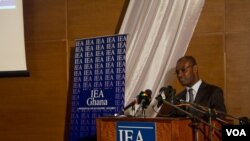Ghana’s presidential candidates are preparing for the second and final debate of the general election ahead of next month’s vote.
The event, delayed by 24 hours following the death of former Vice President Aliyu Mahama, will be held in Accra from 6:30 p.m. to 10:00 p.m. local time.
The debate organizer, the Institute of Economic Affairs (IEA), says the debate gives prospective voters the opportunity to evaluate the policy proposals of the candidates to enable them choose the next president.
“What we do is to create a platform for the presidential candidates to outline their policy programs for government. This helps to shift the election campaign process from one of personality, attacks and acrimony to an issue-based campaign process,” said Michael Ofori-Mensah, IEA’s policy analyst.
The debates, he said, have generated lots of public interest in the run up to December’s presidential, legislative and local elections.
“I can assure you that the issues that came up in the first presidential debate, as well as the vice presidential debate, provoked intense interest in the policy details, and in fact the issues were discussed for over a week in the media,” said Ofori-Mensah. “This is to inform voters about the [candidates] policy proposals. And this is very good for Ghana, and it’s going to enhance and strengthen the pillars of our young democracy.”
The debate on Wednesday will be the second for the candidates this year. The only vice presidential debate was held two weeks ago.
President John Dramani Mahama, of the ruling National Democratic Congress (NDC), faces a stiff challenge from main opposition leader Nana Addo Dankwa Akufo-Addo of the New Patriotic Party (NPP), Michael Abu Sakara Foster, of the Convention People’s Party (CPP), Papa Kwesi Nduom of the Progressive People’s Party (PPP), and Hassan Ayariga of the People’s National Convention (PNC).
“This time around, what we have been doing is to also [translate the debate] into local languages, [with] key parts of the presidential debate summarized and broadcast on the local radio stations in different languages to sensitize the voters,” said Ofori-Mensah.
A decision by IEA to limit debate participation to parties with representation in parliament has sparked supporters of some parties to accuse the group of discrimination.
The criteria, the critics say fails to level the political playing field. They say it prevents voters from hearing from all the candidates cleared by the electoral commission to participate in the December vote.
But, Ofori-Mensah said opinions are divided about the IEA’s criteria.
“You will be surprised to know that at the same time that people are arguing for us to expand the net into including all candidates, we have also had people writing to us and telling us that we should just focus on the two big parties. Because those are the only candidates who could actually have a chance of winning the presidency,” said Ofori-Mensah.
The event, delayed by 24 hours following the death of former Vice President Aliyu Mahama, will be held in Accra from 6:30 p.m. to 10:00 p.m. local time.
The debate organizer, the Institute of Economic Affairs (IEA), says the debate gives prospective voters the opportunity to evaluate the policy proposals of the candidates to enable them choose the next president.
“What we do is to create a platform for the presidential candidates to outline their policy programs for government. This helps to shift the election campaign process from one of personality, attacks and acrimony to an issue-based campaign process,” said Michael Ofori-Mensah, IEA’s policy analyst.
The debates, he said, have generated lots of public interest in the run up to December’s presidential, legislative and local elections.
“I can assure you that the issues that came up in the first presidential debate, as well as the vice presidential debate, provoked intense interest in the policy details, and in fact the issues were discussed for over a week in the media,” said Ofori-Mensah. “This is to inform voters about the [candidates] policy proposals. And this is very good for Ghana, and it’s going to enhance and strengthen the pillars of our young democracy.”
The debate on Wednesday will be the second for the candidates this year. The only vice presidential debate was held two weeks ago.
President John Dramani Mahama, of the ruling National Democratic Congress (NDC), faces a stiff challenge from main opposition leader Nana Addo Dankwa Akufo-Addo of the New Patriotic Party (NPP), Michael Abu Sakara Foster, of the Convention People’s Party (CPP), Papa Kwesi Nduom of the Progressive People’s Party (PPP), and Hassan Ayariga of the People’s National Convention (PNC).
“This time around, what we have been doing is to also [translate the debate] into local languages, [with] key parts of the presidential debate summarized and broadcast on the local radio stations in different languages to sensitize the voters,” said Ofori-Mensah.
A decision by IEA to limit debate participation to parties with representation in parliament has sparked supporters of some parties to accuse the group of discrimination.
The criteria, the critics say fails to level the political playing field. They say it prevents voters from hearing from all the candidates cleared by the electoral commission to participate in the December vote.
But, Ofori-Mensah said opinions are divided about the IEA’s criteria.
“You will be surprised to know that at the same time that people are arguing for us to expand the net into including all candidates, we have also had people writing to us and telling us that we should just focus on the two big parties. Because those are the only candidates who could actually have a chance of winning the presidency,” said Ofori-Mensah.





